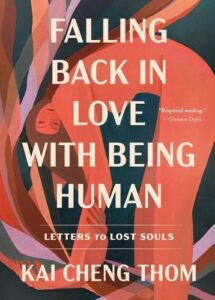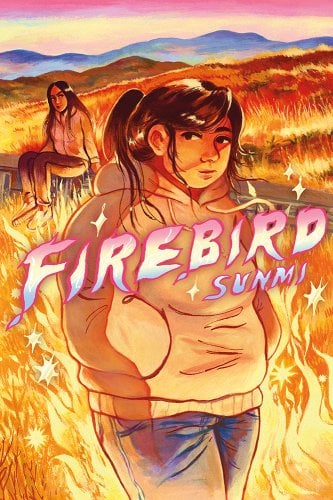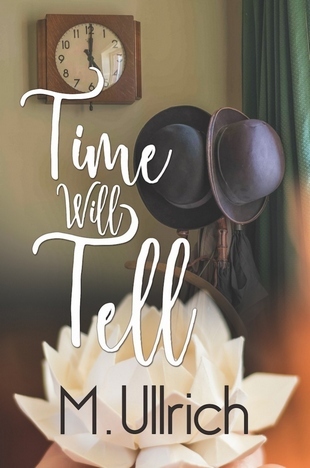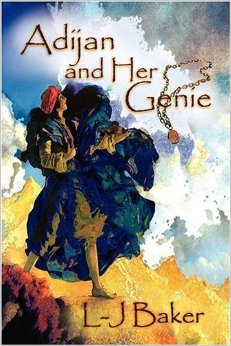Editor’s note: This is one of the rare Lesbrary reviews of a book that doesn’t have sapphic content.
Kai Cheng Thom dedicates Falling Back in Love with Being Human to “all the monsters who are still waiting to be loved.” Fun fact: In Mary Shelley’s Frankenstein, the being that Victor creates is referred to as a “creature” far more he is referred to as a “monster.” Creature or Monster—that decision is always made by the person who beholds him. Because that’s the thing about monsters: we don’t get to choose who sees us as monstrous. All we—trans women—can do is be the monster, which is what Thom implores us to do. She tells us to be the monster, be the witch, be the madwoman.
Falling Back in Love with Being Human is a book that can be read in under an hour, but it can be an overwhelming experience that will stay with you for much longer. In this series of letters, Thom writes of the grief and sorrow and loss that comes with being a trans woman. There are many parts of the book that do not reflect my experience because, as it turns out, not all monsters are alike. Among other topics, she writes about being a trans woman of color, her sexuality, and her experiences with Christianity. (Another part of the book that does not reflect my experience is that there is no sapphic content in this book, though Thom has written elsewhere about the problems that trans fems face in the sapphic community.) The epistolary frame allows her to discuss all of these experiences for the benefit of all readers while addressing certain people directly. Even when you are not the person who she’s addressing, though, Thom’s writing is invitational rather than exclusionary.
Yes, she is somehow inviting even in her letter to Joanne Rowling, in which she refers to us as “the Ones Who Lived.” She implores TERFs in another letter to see us monsters as people who have so much to give and no desire to take away. The anger is palpable, but Thom expresses it in a way that still aligns with her goal of making this work an expression of love and self-acceptance.
A book that feels this deeply personal is not an easy thing to write about. That is perhaps the best recommendation that I could provide for Falling Back in Love with Being Human. There’s a reason that I prefer to write about sapphic romances; HEAs and the tropes that us sapphic folks share are comforting. They are a nice break from the other tropes and all the doubts about whether a HEA will ever be in the cards for this monster.
I imagine that Falling Back in Love with Being Human might be a difficult read for some; if you’re reading this review, however, I urge you to pick up Thom’s book. Early results of the 2022 U.S. Trans Survey were released recently. Though the vast majority of us (94% of 92,329 people surveyed) are happy with the decision that we’ve made regarding our gender, over half of us are thinking about or have already moved to another state because of unequal treatment. Falling Back in the Love with Being Human is far more powerful than survey results (even though the U.S. Trans Survey is itself an extremely powerful story told in a responsible, ethical manner). Thom provides a narrative that is similar to the survey results in many ways, but her version of the story is the monster’s version.
And that’s the other thing about monsters: people are always telling stories about us. One more fun fact: There are two versions of Shelley’s Frankenstein. There’s the 1818 version where the Creature has the possibility of free will and humanity, and the 1831 version where the Monster is kind of, well, doomed. It would be accurate to say that Shelley “saw some things” in the intervening years, souring her view on humanity. Thom asks all of us to move in the opposite direction. She knows that some people walk around with an image of “the ghost of a monstrous transsexual…in their heads,” and yet she implores us to choose love anyway. Thom’s stories cast us as a sisterhood of outlaws, caregivers, deathwalkers, and sidekicks whose Bruce Wayne never showed up. My favorite story that she tells about us monsters is the one about the “silly girl,” “the girl who was never meant to exist but breathed herself into being on the strength of her desire alone.”
There is no Victor Frankenstein in this story, but there are monsters like Kai Cheng Thom who are doing their best to light the way.
Content warning: many different kinds of violence
Liv (she/her) is a trans woman, a professor of English, and a reluctant Southerner. Described (charitably) as passionate and strong-willed, she loves to talk (and talk) about popular culture, queer theory, utopias, time travel, and any other topic that she has magpied over the years. You can find her on storygraph and letterboxd @livvalentine.



